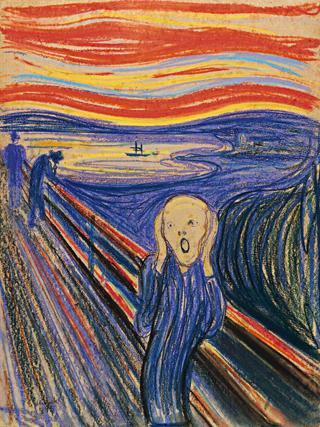When I teach my anthropology of religion course, on the first day of class I ask students why they think religion exists or what purpose it serves. Without fail, the majority of students state that the primary function of religion is to provide meaning (which it does in part by purporting to explain why people and things are as they are). The emotional aspects of religion — to allay fear, assuage anxiety, provide comfort, offer hope — run a distant second. The ethical or moral aspects usually place third.
While all these answers are correct, they primarily describe religions that arose during the Axial Age. These are not universal features of religion. The religions that are most concerned with meaning (along with death, suffering, ethics, and transcendence) are Axial, products of particular times and places. As I noted in this post on death and this one on the Axial prelude, these were all relatively new religions that responded to particular kinds of historical, political, and socioeconomic conditions. I also noted that because these conditions were unique to agricultural societies, the “religion” found in non-agricultural societies isn’t much concerned with meaning, suffering, death, ethics, or transcendence.

Where animist-shamanist worldviews are dominant (mostly in small-scale societies), the persistent conditions that cause people to interrogate meaning, suffering, death, and morals simply don’t exist. People in such societies generally don’t yearn to transcend this world or life, and don’t feel any compulsion to unify themselves with the cosmos or reach some higher plane of existence. They do not, in other words, suffer from existential angst or modernist anomie. It has often been said that animists are world affirming, whereas Axials are world rejecting. While there are exceptions to this generalization, the tone and feel — or overall thrust, is correct.
What might account for animist affirmation and absence of existential angst? Aside from the obvious (such as communal living among extended kin), it probably has something to do with the animist worldview: there is none of the dualism which so dominates our western ways of thinking. I’m not sure whether this fully integrated way of perceiving (epistemology) and being (ontology) is a cause or an effect, but I do know that it gives rise to a sense of comfort. Meaning is inherent in life and the world. Life entails death. Suffering is part of the process. There is no need to transcend any of it.
For quite some time, I thought I was more or less alone in perceiving these aspects of animism. I’m not. The other day, in the strangest of journal places (Medical Hypotheses), I found Bruce Charlton’s article “Alienation, Recovered Animism and Altered States of Consciousness” (2007). It opens rather provocatively:
Alienation is the feeling that life is ‘meaningless’, that we do not belong in the world. But alienation is not an inevitable part of the human condition: some people do feel at one with the world as a consequence of the animistic way of thinking which is shared by children and hunter-gatherers. Animism considers all significant entities to have ‘minds’, to be ‘alive’, to be sentient agents. The animistic thinker inhabits a world populated by personal powers including not just other human beings, but also important animals and plants, and significant aspects of physical landscape. Humans belong in this world because it is a web of social relationships.
Animism is therefore spontaneous, the ‘natural’ way of thinking for humans: all humans began as animistic children and for most of human evolutionary history would have grown into animistic adults. It requires sustained, prolonged and pervasive formal education to ‘overwrite’ animistic thinking with the rationalistic objectivity typical of the modern world. It is this learned abstraction that creates alienation–humans are no longer embedded in a world of social relations but become estranged, adrift in a world of indifferent things.
While Charlton and I don’t agree on the primary causes of alienation, I agree with his assessment of animism and its contrast to alienation. Because I was surprised to read this in a medical journal, I did some digging and learned that Medical Hypotheses is a (refreshingly) odd journal with a unique history. I also learned that Bruce Charlton, the author of the alienation-animism paper, is editor of the journal. He has posted the full paper, along with a retraction of sorts (“since writing this piece my understanding has changed and I now believe it contains fundamental flaws”), here. You can find an earlier version of the paper (which connects animism to neo-shamanism) here.
At his invitation, I have emailed Dr. Charlton for clarification of the paper’s flaws. In the meantime, I’m going to see my own doctor tomorrow for a surgery that surely would have benefited many hunter-gatherers in the past. A few days ago I was lifting something heavy when I heard and felt a horrendous tearing or ripping. My bicep tendon is no longer attached to my elbow.


